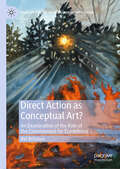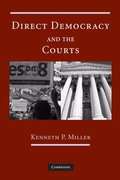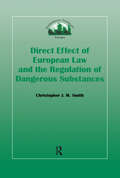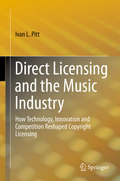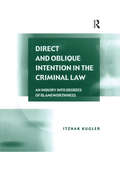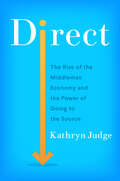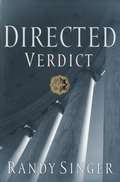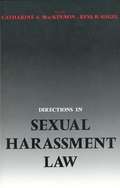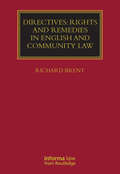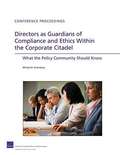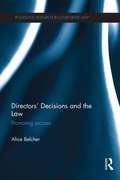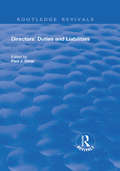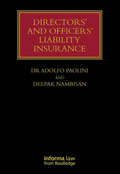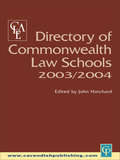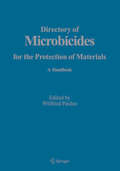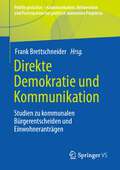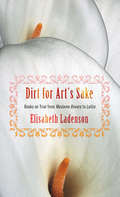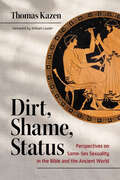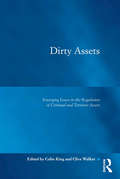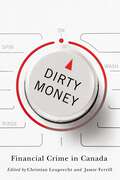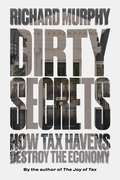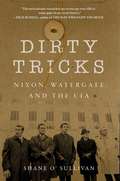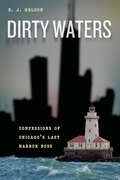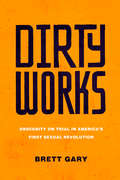- Table View
- List View
Direct Action as Conceptual Art?: An Examination of the Role of the Communiqué for Ecodefense (Palgrave Studies in Crime, Media and Culture)
by Avi BrismanThis book offers an avenue for understanding the parameters, scope, meanings, and impacts of environmental protest. Focusing on ecodefense, it explores the significance of the communiqué (the written explanation of the reasons for an act of ecodefense), comparing the communiqué to written texts in Conceptual art. It presents and seeks to evaluate the following analogy: act of ecodefense : communiqué :: work of conceptual art : written declaration/statement. By considering the communiqué in this light, this book helps us better comprehend the rationales for “radical environmentalism” undertaken for the purposes of reducing environmental harms, natural resource exploitation, and animal abuse.
Direct Democracy and the Courts
by Kenneth P. MillerWho should have the last word on fundamental policy issues? This book analyzes the rise of two contenders - the people, through direct democracy, and the courts. Introduced in the U.S. during the Progressive Era and now available in nearly half the states, direct democracy has surged in recent decades. Through ballot measures, voters have slashed taxes, mandated government spending, imposed term limits on elected officials, enacted campaign finance reform, barred affirmative action, banned same-sex marriage, and adopted many other controversial laws. In several states, citizens now bypass legislatures to make the most important policy decisions. However, the "people's rule" is not absolute. This book demonstrates that courts have used an expanding power of judicial review to invalidate citizen-enacted laws at remarkably high rates. The resulting conflict between the people and the courts threatens to produce a popular backlash against judges and raises profound questions about the proper scope of popular sovereignty and judicial power in a constitutional system.
Direct Effect Of European Law
by Christopher J SmithFirst Published in 1995. Routledge is an imprint of Taylor & Francis, an informa company.
Direct Licensing and the Music Industry
by Ivan L. PittThis book discusses the economics of the music industry in the context of the changing landscape brought about by innovation, technological change, and rapid digitization. The ability of digital technology to reduce the transaction costs of music copyright licensing has all but destroyed the traditional media business models of incumbent Performance Rights Organizations (PROs), music publishers, record labels, and radio and television stations. In a climate where streaming services are rapidly proliferating and consumers prefer subscription models over direct ownership, new business models, such as direct licensing, are developing. This book provides an overview of the economics of the traditional music industry, the technology-induced changes in business models and copyright law, and the role of publishers, copyright holders and songwriters in the emerging direct licensing model. In Part One, the author examines the economic aspects of direct licensing as an alternative to the traditional blanket license for copyrighted musical compositions, with an emphasis on the often monopolistic nature of PROs. In Part Two, the author focuses on the music publisher and the role direct licensing and competition may play in the changing business models in the music industry and the potential benefits this may bring to copyright holders, such as songwriters. To compliment this model, the author proposes a maximum statutory fixed-rate for musical performances to further streamline the royalty process, especially where distributors such as Google and YouTube are concerned. This book adds to the growing body of literature on the economics of music licensing in the digital age. It will be useful to those in the fields of economics and law, as well as music executives, musicians, songwriters, composers, and other industry professionals who are interested in understanding how technology, innovation and competition have reshaped the music industry.
Direct and Oblique Intention in the Criminal Law: An Inquiry into Degrees of Blameworthiness
by Itzhak KuglerThe subject of intention in the criminal law is currently causing many debates among criminal lawyers. This compelling and probing volume addresses two key questions: should the criminal law distinguish between direct intention and recklessness, and what should the law be concerning cases of oblique intention - i.e. cases in which the actor does not act in order to cause the proscribed result, but is nevertheless practically certain that his, or her, action will cause it? The discussion is divided into two parts with the first being devoted to the question of whether it is justified to grade offences based on the distinction between intention and recklessness. The second part deals with offences in which intention is required as a condition for the criminalisation of the conduct and in the context of which reckless actors are not exposed to criminal liability. The book explores the issue of intention from the viewpoint of degrees of moral culpability and it discusses, inter alia, the doctrine of double effect, the possibility that the law in cases of oblique intention should not be the same for all crimes of intention , and the possibility of using a moral formula in the definition of certain offences. The discussion also addresses many other criminal law issues, including the philosophy of punishment, the role of motives in determining degrees of blameworthiness, sentencing, stigma, and criminal attempts.
Direct: The Rise of the Middleman Economy and the Power of Going to the Source
by Kathryn JudgeFinance expert, law professor, and fellow overwhelmed consumer Kathryn Judge investigates the surprising ways that middlemen have taken control of the economy at the expense of the rest of us, and provides practical guidance about how to regain control, find more meaning, and contribute to a more sustainable economy. Over the past thirty years, middlemen have built intricate financial and retail empires capable of moving goods across the country and around the world—transforming the economy and our lives. Because of middlemen, we enjoy an unprecedented degree of choice and convenience. But the rise of the middleman economy comes at a steep price.In Direct, Columbia law professor Kathryn Judge shows how overgrown middlemen became the backbone of modern capitalism and the cause of many of its ailments. Middlemen today shape what people do, how they invest, and what they consume. They use their troves of data to push people to buy more, and more expensive, products. They use their massive profits and expertise to lobby lawmakers, tilting the playing field in their favor. Drawing on a decade of research, Judge shows how to fight back: Go to the source.The process of direct exchange—and the resulting ecosystem of makers and consumers, investors and entrepreneurs—fosters connection and community and helps promote a more just, resilient, and accountable economic system. Direct exchange reminds us that our actions always and inevitably impact others, as it rekindles an appreciation of our inherent interconnectedness. As Judge reveals in this much-needed book, direct exchange is both the cornerstone of the solution and a tool for revealing just how much is at stake in decisions about “through whom” to buy, invest and give.
Directed Verdict
by Randy SingerIn Saudi Arabia, two American missionaries are targeted by the infamous religious police. The man is killed; his wife arrested and deported to the United States. Compelled by the injustice of her plight, an attorney files an unprecedented civil rights suit against Saudi Arabia and the ruthless head of the Muttawa.
Directions in Sexual Harassment Law
by Catharine A. Mackinnon Reva B. SiegelWhen it was published twenty-five years ago, Catharine MacKinnon's pathbreaking work Sexual Harassment of Working Women had a major impact on the development of sexual harassment law. The U. S. Supreme Court accepted her theory of sexual harassment in 1986. Here MacKinnon collaborates with eminent authorities to appraise what has been accomplished in the field and what still needs to be done. An introductory essay by Reva Siegel considers how sexual harassment came to be regulated as sex discrimination. Contributors discuss how law can best address sexual harassment; the importance and definition of consent and unwelcomeness; issues of same-sex harassment; questions of institutional responsibility for sexual harassment in both employment and education settings; considerations of freedom of speech; effects of sexual harassment doctrine on gender and racial justice; and transnational approaches to the problem. An afterword by MacKinnon assesses the changes wrought by sexual harassment law in the past quarter century.
Directives: Rights and Remedies in English and Community Law
by Richard BrentDirectives: Rights and Remedies in English and Community Law analyses the impact of EC Directives on national law, which has long been a problem and continues to be so - both in terms of interpretation and implementation. This book from barrister Richard Brent provides the reader with practical and invaluable insights on the legislative processes involved, the legal basis for adoption of Directives, the transposition and implementation of Directives.
Directors as Guardians of Compliance and Ethics Within the Corporate Citadel
by Michael D. GreenbergRAND convened a symposium on the perspective and role of corporate boards of directors in overseeing their firms' ethics and compliance matters. These conference proceedings summarize the event and the discussions, which focused on oversight challenges that directors face, board responsibility for corporate culture, and steps that business leaders and policymakers might take to better encourage and empower directors in their oversight role.
Directors' Decisions and the Law: Promoting Success (Routledge Research in Corporate Law)
by Alice BelcherDirectors are key decision-makers in any organisation, whether it is in the public sector, a family business or a transnational company. The UK Companies Act 2006 codified directors’ duties for the first time and describes the director as the ‘most likely to promote the success of the company for the benefit of its members as a whole’. This book addresses key tensions and problems involved in the duties and responsibilities of the director in promoting success, including corporate culture and credibility, trust, risk and uncertainty, collective responsibility, and the degree of control. The book considers directors’ decision-making in both private and public sector organisations and explicitly examines aspects of decision-making during periods of financial distress. The book compares the legal contexts of director’s decisions in the UK to those of the USA, Germany and Australia, and takes an interdisciplinary approach in its combination of management theory, economic theory and behavioural studies. In doing so the book addresses issues key to the understanding of corporate governance in light of recent financial crises.
Directors' Duties and Liabilities
by Paul J. OmarThis title was first published in 2000. The law relating to directors’ duties has fundamental implications across the business environment and yet few areas of business law have received so little detailed examination. This text provides fresh and incisive insights to the rules applying in ten major economic jurisdictions within Europe, with respect to directors’ legal obligations and liabilities. Written by the foremost figures in the field, each contribution outlines the statutory provisions that affect the work of company directors in each jurisdiction, including general legislation and specific laws covering the status of incorporated bodies. Fully illustrated with case-law examples the book provides a guide to the range of measures which national courts may provide for participants in corporate life seeking remedies for unsatisfactory governance of companies. It also features guidance on the specific bases for criminal and civil liabilities and examples of the range of penalties to which directors might be subject. The result is a work of unprecedented detail which will be welcomed by practitioners in the corporate sector, academics and researchers alike.
Directors' and Officers' Liability Insurance (Lloyd's Insurance Law Library)
by Adolfo Paolini Deepak Nambisan“With the ever increasing number of claims against directors and officers, this book provides a very welcome addition to the bookshelves which hitherto have lacked books on this important area” - Alison Green, Chairman of the Trustees of the BILA Charitable Trust. This book scrutinises the origins and the rationale underlying D&O insurance, and provides answers to the question of protecting directors against the potential liabilities they may face. It provides clear understanding about D&O policies wording, exclusions and issues of misrepresentation. The information contained in this new book includes Nature and Legality of D&O Liability Insurance, D&O Exclusions, Directors’ and Officers’ Liability to Third Parties, Directors’ Liability at Civil Law, D&O: Defence Costs Cover and Allocation, Aggregation Principles and D&O Cover and the Reinsurance of D&O Policies.
Directory of Commonwealth Law Schools 2003-2004
by CleaThere are more than 400 Commonwealth law schools, all having an entry within the latest edition of The Directory of Commonwealth Law Schools. Each entry includes full contact details, courses offered, law journals published and research centres. This edition has been thoroughly revised, updated and expanded to take account of changes over the last two years. This directory also contains full details of the activities of the Commonwealth Legal Education Association together with a section devoted to law in the Commonwealth. This includes copies of the major Commonwealth instruments and details of Commonwealth activities of particular interest to law teachers and practitioners, making it a valuable resource and reference work.
Directory of Microbicides for the Protection of Materials
by Wilfried PaulusThis edition is divided into two parts. Part One presents extensively diversified contributions from 23 world experts, on such topics as: Microbicides with regard to the relationship between chemical structure and mode of action and activity; Research and development in consideration of registration procedures; Legislative aspects. The use of microbicides in 18 major application areas are described in detail. Part Two collects Microbicide Data, organized into 21 substance classes (e.g. alcohols, aldehydes, acids, amides, etc.), and including some 300 entries.
Direkte Demokratie und Kommunikation: Studien zu kommunalen Bürgerentscheiden und Einwohneranträgen (Politik gestalten - Kommunikation, Deliberation und Partizipation bei politisch relevanten Projekten)
by Frank BrettschneiderDieses Buch thematisiert Bürgerentscheide als Instrument direkter Demokratie auf der kommunalen Ebene. Auch Gemeinderäte greifen auf dieses Instrument direkter Demokratie zurück, um die Legitimationsbasis für besondere Projekte zu vergrößern. Bei den Abstimmungen sollten sachfremde Aspekte möglichst keine Rolle spielen. Daher sind die Verständlichkeit des Fragewortlauts sowie die Qualität der Abstimmungsbroschüren besonders wichtig. Ebenfalls sehr wichtig sind vorgeschaltete dialogische Beteiligungsverfahren (z. B. Bürger-Foren). Sie verbessern in der Regel die Abstimmungsqualität.
Dirt for Art's Sake
by Elisabeth LadensonIn Dirt for Art's Sake, Elisabeth Ladenson recounts the most visible of modern obscenity trials involving scandalous books and their authors. What, she asks, do these often-colorful legal histories have to tell us about the works themselves and about a changing cultural climate that first treated them as filth and later celebrated them as masterpieces? Ladenson's narrative starts with Madame Bovary (Flaubert was tried in France in 1857) and finishes with Fanny Hill (written in the eighteenth century, put on trial in the United States in 1966); she considers, along the way, Les Fleurs du Mal, Ulysses, The Well of Loneliness, Lady Chatterley's Lover, Tropic of Cancer, Lolita, and the works of the Marquis de Sade. Over the course of roughly a century, Ladenson finds, two ideas that had been circulating in the form of avant-garde heresy gradually became accepted as truisms, and eventually as grounds for legal defense. The first is captured in the formula ?art for art's sake'the notion that a work of art exists in a realm independent of conventional morality. The second is realism, vilified by its critics as ?dirt for dirt's sake. ' In Ladenson's view, the truth of the matter is closer to ?dirt for art's sake'the idea that the work of art may legitimately include the representation of all aspects of life, including the unpleasant and the sordid. Ladenson also considers cinematic adaptations of these novels, among them Vincente Minnelli's Madame Bovary, Stanley Kubrick's Lolita and the 1997 remake directed by Adrian Lyne, and various attempts to translate de Sade's works and life into film, which faced similar censorship travails. Written with a keen awareness of ongoing debates about free speech, Dirt for Art's Sake traces the legal and social acceptance of controversial works with critical acumen and delightful wit.
Dirt, Shame, Status: Perspectives on Same-Sex Sexuality in the Bible and the Ancient World
by Thomas KazenA scholarly examination of same-sex sexuality in the Bible in the context of the ancient world Scriptural prohibitions of same-sex sexual acts (so-called &“clobber passages&”) are often used as prooftexts to support the oppression of LGBT communities in the West today. However, such interpretation of these scant references ignores critical sociohistorical context from the ancient world. Analyzing a wealth of primary sources, Thomas Kazen brings biblical studies into conversation with the sexual norms and practices of the ancient world. Near Eastern, Greek, and Roman texts, including the Old and New Testaments, exhibit ancient concerns about hierarchy in sexual relationships. Examining references to sexuality through the lenses of power and subordination, honor and shame, and purity, Kazen sheds light on homophobic passages in the Bible. Special attention is given to the Levitical laws and the Pauline epistles. Ultimately, Kazen calls us to renegotiate the balance between our ancient heritage and our contemporary values. Carefully researched and accessibly presented, Dirt, Shame, Status lends readers insight into the diverse cultural influences on the Bible. Kazen&’s work offers an informed and important perspective on a controversial topic of perennial interest. Scholars, students, and all curious readers of Scripture will find this volume to be an indispensable resource for understanding complex ancient texts and contexts.
Dirty Assets: Emerging Issues in the Regulation of Criminal and Terrorist Assets (Law, Justice And Power Ser.)
by Clive Walker Colin KingAdopting a multi-disciplinary and comparative approach, this book focuses on the emerging and innovative aspects of attempts to target the accumulated assets of those engaged in criminal and terrorist activity, organized crime and corruption. It examines the ’follow-the-money’ approach and explores the nature of criminal, civil and regulatory responses used to attack the financial assets of those engaged in financial crime in order to deter and disrupt future criminal activity as well as terrorism networks. With contributions from leading international academics and practitioners in the fields of law, economics, financial management, criminology, sociology and political science, the book explores law and practice in countries with significant problems and experiences, revealing new insights into these dilemmas. It also discusses the impact of the ’follow-the-money’ approach on human rights while also assessing effectiveness. The book will appeal to academics and researchers of financial crime, organized crime and terrorism as well as practitioners in the police, prosecution, financial and taxation agencies, policy-makers and lawyers.
Dirty Entanglements
by Louise I. ShelleyThe entangled threat of crime, corruption, and terrorism now deserves high-level-policy attention because of its growth trajectory. Using lively case studies, this book analyzes the transformation of crime and terrorism and the business logic of terrorism. Louise I. Shelley concludes that corruption, crime, and terrorism will remain important security challenges in the twenty-first century as a result of economic and demographic inequalities in the world, the rise of ethnic and sectarian violence, climate change, the growth of technology, and the failure of nineteenth- and twentieth-century institutions to respond to these challenges when they emerged.
Dirty Money: Financial Crime in Canada
by Christian Leuprecht and Jamie FerrillFinancial crime in Canada remains a mystery: omnipresent, but we know little about its operation. Transactions are cloaked with apparent legality, which makes tracking criminal activity through economic or financial statistics a complex undertaking.This distinctive volume aims to stem in-, out-, and through-flows of vast sums of dirty money by enhancing Canada’s capacity to detect, disrupt, deter, investigate, and prosecute domestic financial criminals and transnational organized criminal organizations. It brings together leading scholars and practitioners from the public and private sectors to identify and explore deficiencies in federal and provincial policy, regulation, legislation, politics, institutions, and enforcement, as well as the international financial crime regime. Together contributors pinpoint weaknesses that have turned the Canadian federation into a destination of choice for global financial crime, where its perpetrators can operate with impunity.Dirty Money reveals how globalization and technology have spun an extensive web of clandestine processes that disguises how financial criminals operate, the channels they use, and how they suborn banks and institutions. In the process, the extent of financial crime in Canada and its corrosive effects on communities, democratic institutions, and prosperity becomes apparent.Contributors: Sanaa Ahmed, John Cassara, Garry Clement, Arthur J. Cockfield, Caroline Dugas, Jamie Ferrill, Cameron Field, Michelle Gallant, Peter German, Rhianna Hamilton, Todd Hataley, Caitlyn Jenkins, Christian Leuprecht, David Maimon, Katarzyna (Kasia) Mcnaughton, Denis Meunier, Pierre-Luc Pomerleau, Stephen Schneider, Jeffrey Simser.
Dirty Secrets: How Tax Havens Destroy the Economy
by Richard MurphyWhat happens when the rich are allowed to hide their money in tax havens, and what we should do about itThe Panama Papers were a reminder of how the superrich are allowed to hide their wealth from the rest of us. Dirty Secrets uncovers the extent of the corruption behind this crisis and shows what needs to be done in the face of this unregulated spread of rampant greed.Tax havens, we are often told, are part of the global architecture of capitalism, providing a freedom from regulation necessary to make markets work. In this book, leading authority Richard Murphy uncovers the truth behind this lie. The fact of the matter is that this increasingly popular practice threatens the foundations of democracy, sowing mistrust and creating a regime based upon opacity.As Murphy shows, how we manage our economy is a political decision, and one that can be changed. Dirty Secrets proposes ways to regulate tax havens and what the world might look like without them.
Dirty Tricks: The Dark Side of Democracy
by Shane O'SullivanThe victory of Richard Nixon in the US presidential election of 1968 swung on an “October Surprise”— a treasonous plot engineered by key figures in the Republican Party to keep the South Vietnamese government away from peace talks in Paris, costing thousands of American lives. There is growing evidence that the CIA was deeply involved in illegal domestic operations targeting Daniel Ellsberg, and in the Watergate break-ins during Nixon’s 1972 campaign, which ultimately led to his downfall. CIA Director Richard Helms’ relationship with Watergate burglar E. Howard Hunt was much closer than previously disclosed and the CIA agent inside the plot was sent on a double agent mission by American intelligence after he got out of prison. Drawing on newly-declassified files and previously-unpublished documents, Dirty Tricks debunks the myths around Watergate and deepens our understanding of the “dirty tricks” that undermined democracy during the Nixon years and destroyed public trust in politics during the seventies. These scandals turn on the covert action of two powerful interest groups—the senior CIA officers around Helms, and the key advisers around Nixon – in this chilling story of political espionage and deception.
Dirty Waters: Confessions of Chicago's Last Harbor Boss
by R. J. NelsonIn 1987, the city of Chicago hired a former radical college chaplain to clean up rampant corruption on the waterfront. R. J. Nelson thought he was used to the darker side of the law--he had been followed by federal agents and wiretapped due to his antiwar stances in the sixties--but nothing could prepare him for the wretched bog that constituted the world of a Harbor Boss. Director of Harbors and Marine Services was a position so mired in corruption that its previous four directors ended up in federal prison. Nelson inherited angry constituents, prying journalists, shell-shocked employees, and a tobacco-stained office still bearing a busted door that had been smashed in by the FBI. Undeterred, Nelson made it his personal mission to become a "pneumacrat," a public servant who, for the common good, always follows the spirit--if not always the letter--of the law. Dirty Waters is a wry, no-holds-barred memoir of Nelson's time controlling some of the city's most beautiful spots while facing some of its ugliest traditions. A guide like no other, Nelson takes us through Chicago's beloved "blue spaces" and deep into the city's political morass. He reveals the different moralities underlining three mayoral administrations, from Harold Washington to Richard M. Daley, and navigates us through the gritty mechanisms of the Chicago machine. He also deciphers the sometimes insular world of boaters and their fraught relationship with their land-based neighbors. Ultimately, Dirty Waters is a tale of morality, of what it takes to be a force for good in the world and what struggles come from trying to stay ethically afloat in a sea of corruption.
Dirty Works: Obscenity on Trial in America’s First Sexual Revolution
by Brett GaryA rich account of 1920s to 1950s New York City, starring an eclectic mix of icons like James Joyce, Margaret Sanger, and Alfred Kinsey—all led by an unsung hero of free expression and reproductive rights: Morris L. Ernst. At the turn of the twentieth century, the United States was experiencing an awakening. Victorian-era morality was being challenged by the introduction of sexual modernism and women's rights into popular culture, the arts, and science. Set during this first sexual revolution, when civil libertarian-minded lawyers overthrew the yoke of obscenity laws, Dirty Works focuses on a series of significant courtroom cases that were all represented by the same lawyer: Morris L. Ernst. Ernst's clients included a who's who of European and American literati and sexual activists, among them Margaret Sanger, James Joyce, and Alfred Kinsey. They, along with a colorful cast of burlesque-theater owners and bookstore clerks, had run afoul of stiff obscenity laws, and became actors in Ernst's legal theater that ultimately forced the law to recognize people's right to freely consume media. In this book, Brett Gary recovers the critically neglected Ernst as the most important legal defender of literary expression and reproductive rights by the mid-twentieth century. Each chapter centers on one or more key trials from Ernst's remarkable career battling censorship and obscenity laws, using them to tell a broader story of cultural changes and conflicts around sex, morality, and free speech ideals. Dirty Works sets the stage, legally and culturally, for the sexual revolution of the 1960s and beyond. In the latter half of the century, the courts had a powerful body of precedents, many owing to Ernst's courtroom successes, that recognized adult interests in sexuality, women's needs for reproductive control, and the legitimacy of sexual inquiry. The legacy of this important, but largely unrecognized, moment in American history must be reckoned with in our contentious present, as many of the issues Ernst and his colleagues defended are still under attack eight decades later.
